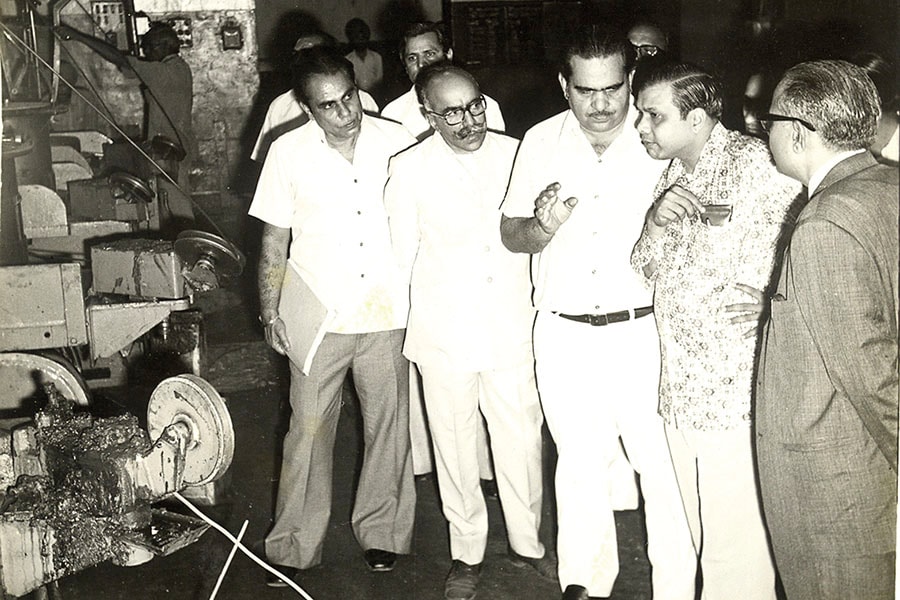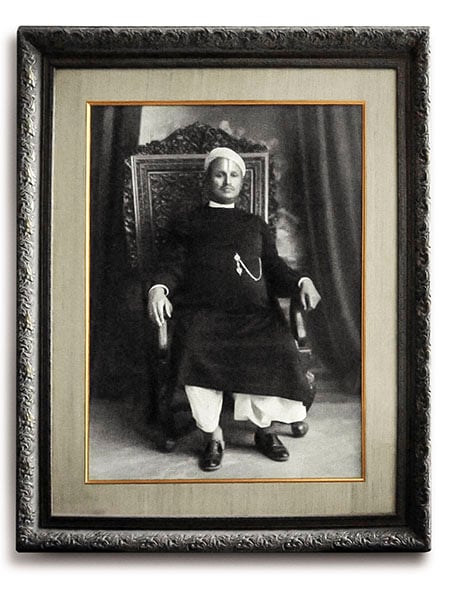How the Bangurs of Shree Cement salvaged a legacy
The Bangurs of Shree Cement, having salvaged a legacy, are putting their trust in innovation and peer dynamics: They're No 32


Patriarch Benu Gopal with grandson Prashant and son Hari Mohan at the Bangur family home
Image: Sumit Dayal for Forbes
Outside Shree Cement’s head office in Kolkata, bulging yellow Ambassador taxis jostle for space with belching, jam-packed, colourful buses on the one-way street, in sharp contrast to the staid, elegant, white colonial-era building where the executives sit. But it has been Shree’s ability to navigate chaos in a country where the company is the fastest-growing cement producer that has vaulted its owners, the Bangur clan, back into the top rungs of wealth.
They have been there before, at least according to company lore. Through the 1960s, when the Bangurs were a more diversified yet on some levels more united lot, they were among the top ten in a more modest India. Then came the kind of disruption and disunity that undermines many a family fortune. In surviving it, the difference for this clan was the decisiveness of Benu Gopal Bangur, now at age 85 the patriarch, and the follow-through of his son, Hari Mohan, now managing director.
Benu got the cement business in a split among brothers and cousins and built Shree around that core. Modern India, in turn, has made such building material and Shree’s ability to supply it at a favourable cost a source of renewed wealth. Twenty years ago, Shree Cement was a $56 million business. Today revenues exceed $1 billion. The market capitalisation has reached $8.7 billion, and Benu and his offspring hold 65 percent.
The Bangurs hail from the western state of Rajasthan, across the country from their current home in Kolkata, and are Marwaris—an ethnic group known for business and financial smarts. Benu credits this orientation for the 1906 move across India by his grandfather, Mugnee Ram, and a great-uncle: In colonial times, the port city of Kolkata was the centre of commerce and the capital of British India. The boys left behind a life of poverty.
Ram took up the brokering of milled jute, a key commodity obtained from what was then East Bengal. The onset of World War I led to speculation in such resources and, as Benu tells it, to his grandfather’s first 100,000-rupee fortune. He used that money to offer loans for land purchases, acquiring large parcels of land when borrowers defaulted.
By World War II, Ram had his own jute mill, which the British seized for military use, but the pre-independence 1940s took him around to India’s regional princes, hungry for industrial activity. In Gujarat and Rajasthan, Ram got dispensations for cement and textile plants. Both paid off handsomely for him: In an economy of shortages, if you could manufacture anything, it would sell.
This business boldness contrasted with an otherwise traditional attitude that discouraged foreign travel (taboo among Hindus of yore), prohibited women from working and kept children in close tow. (Bangur kids growing up in the 1960s hewed to the traditional dress of their elders, with young boys dressed in dhotis and their foreheads anointed). A young Benu Gopal Bangur (second from right) receives an industrial briefing
A young Benu Gopal Bangur (second from right) receives an industrial briefing
Kolkata remained the locus of family operations, though by the 1970s, its best days were behind it. The jute mills were declining, a Maoist insurgency was deterring investments, and Bengal India in general was losing out to the rise of Mumbai in the west and Delhi in the north.
By then, the Bangur family had dispersed across branches and businesses, all run by loyalists rather than professional management. The different factions reported to the patriarch, who also controlled the purse strings. Business decisions were made based on who got his ear rather than on their own merit, leading to competing factions and infighting, say people familiar with the history. The management gap also meant that the group didn’t keep up with changes wrought by technology and globalisation.
In 1991, the holdings were split three ways Benu and his brother got a third of the pile. They subdivided this further in 1997, and it was then that Benu got the cement business. Although managed from Kolkata, its operations go where material is sourced, such as in the ancestral Rajasthan, where the Bangurs still have homes. He and Hari Mohan spent the next couple of years ramping it up, nearly tripling capacity. Alas, that was just in time for the post-millennial global economic slowdown.
“We had no chance of surviving,” recalls the son, 64, in his spacious office, his desk filled with papers—but no computers—and a couple of modern interpretations in fibreglass of the Hindu deity Krishna. The slowdown was his first big crisis, as his father had taken a backseat in operations by then. Hari Mohan reached out to the French cement-maker Vicat to buy the entire business. They met in Paris in July 2000 and agreed on the terms. Vicat would pay about $65 million. The deal was to be signed the morning after the meeting. But the heir realised he wasn’t ready to let go of his legacy, even if holding on meant a cheaper sale later.
“I thought that if it’s saleable [on that day], it’ll be saleable after another year,” he recalls. “Their agreeing to buy gave me enough confidence that I could try [my hand at this] for another year.” His father agreed.
That’s when the company brought in technology that helped cut costs drastically and changed its fortunes.
The secret was petroleum coke, which was half the cost of coal at the time and, as the Bangurs came to realise, could easily replace it as the fuel source for making cement. This was also when Reliance Industries, India’s largest petrochemical company, started selling petcoke, heretofore dismissed as a waste by-product. [Reliance Industries owns Network18, the publishers of Forbes India.] Technicians that Shree had dispatched to Germany had found out otherwise.
“We had been failing in our efforts with it, and we were unenthusiastic about using it,” recalls Hari Mohan. But he stuck by his team’s findings, and the new fuel gave Shree a significant cost advantage over other cement producers. (Today its plants can switch between petcoke and coal, depending on the market price of the fuel source.)
“We kept it a trade secret for eight years,” says Hari Mohan with a laugh. “Then Reliance started participating in industry conferences and talking about it,” looking for more buyers for the product.
According to one stock analyst at BNP Paribas (which has done banking for the company), Shree enjoys an average 25 percent cost edge on major Indian rivals. Apart from petcoke, its other advantages are modular plants—which can be expanded or contracted—and, on top of the fuel-switching capacity, eco-friendly waste-heat recovery systems.
The first man: Mugnee Ram BangurSuch green technology wasn’t a no-brainer. “It increases the cost, and recovery can take up to ten years, so you should do it only if you have spare cash, which we did,” says Hari Mohan. “We end up spending more, but we’re investing for the future, for whenever the bad times come—we’re prepared.”
For Shree, investing in R&D, especially in efforts that decrease the costs of power, fuel and logistics—which add up to more than half the expense for a cement company—is a priority, and it doesn’t affect fixed costs or employee expenses. (The company does a random check of expense reports submitted. If it finds there’s been misuse by an employee, it penalises him only by putting his name on a notice board for a week—using the concept of peer pressure, says Hari Mohan.)
The Bangurs seek an experimental culture in an unusual way: All employees are paid a fixed salary, and no one is offered any incentives or employee stock-ownership plans. Hari Mohan hopes peer pressure will ensure that there aren’t any laggards. “Everyone has to survive in the same society,” he says. “Peer pressure to perform is high.”
With that mindset, all successes are attributed to teamwork, as are all failures. And there are lots of failures—an almost 80 percent failure rate on innovations, he says. “But because there’s no fear of failure, people are more free to give ideas and experiment.” (The waste-heat system succeeded only on its third attempt.)
Another big theme is autonomy—Hari Mohan and his son Prashant, at age 36, the joint managing director, focus most on R&D, leaving the other day-to-day work to hires. Prashant, in fact, points to standing instructions that if the owners don’t get back on a question within 48 hours, the manager in question is free to make his own decision, a rare practice at promoter-run companies in India.
Prashant learnt how seriously his family takes delegation when he joined as a trainee in 2003. “I was told not to ‘improve’ anything for the first year,” he notes. His father said if the company had survived for so long, it could go another year before the new kid started making suggestions affecting staff.
As the company has vastly expanded capacity and reach across much of India, it is attaining critical mass. BNP Paribas finds it has a 21 percent market share in the northern part of the country.
But for different reasons than at the earlier flush period in the 1960s, the Bangurs have cause to ponder their growth push. In August, the Competition Commission of India, a government watchdog, imposed a nearly billion-dollar penalty on ten cement companies, including Shree, and their industry lobby group for alleged cartelisation.
This time the family speaks with one voice. Hari Mohan says, “We feel we have not cartelised. Ultimately it is for the courts to do the justice. If the courts say we have to pay, we have to pay. That is for the full industry.”
First Published: Dec 15, 2016, 07:28
Subscribe Now